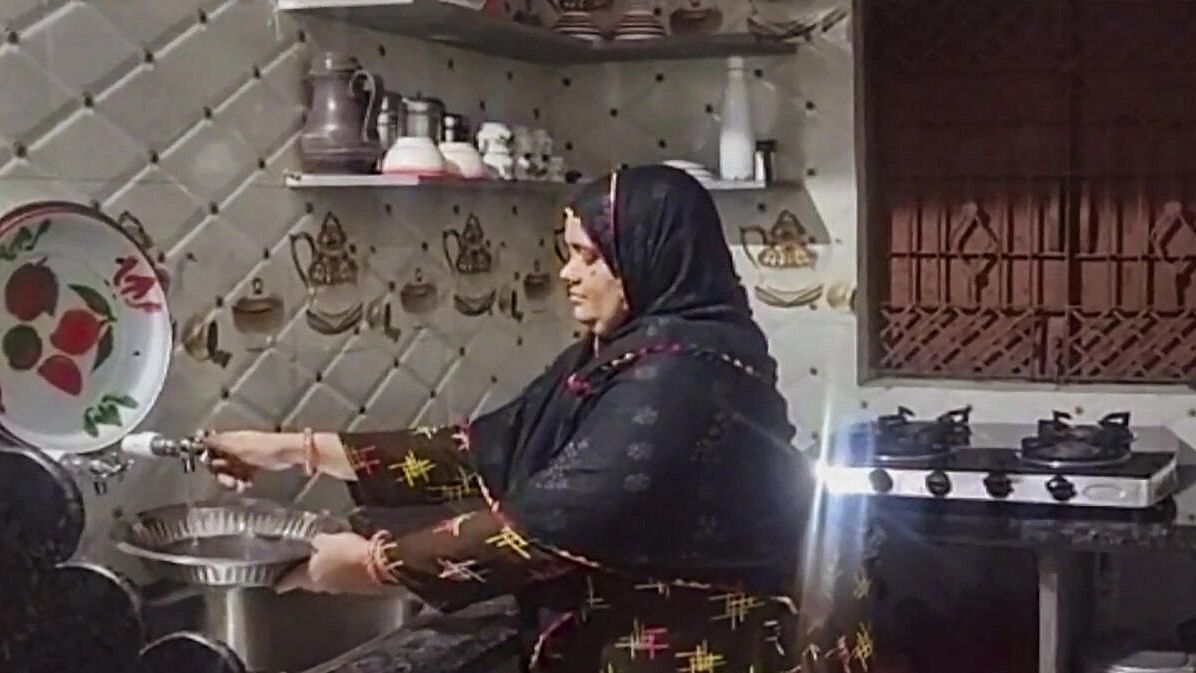
Bilkis Bano, who was gang-raped during the 2002 riots in Gujarat, at her residence, in Mumbai, Monday, Jan. 8, 2024. The Supreme Court on Monday quashed the Gujarat government's decision to grant remission to 11 convicts in the case and directed the convicts to surrender before jail authorities within two weeks.
Credit: PTI Video
New Delhi: The Supreme Court on Monday directed 11 convicts in the Bilkis Bano case to surrender within two weeks, after quashing the remission order passed by the Gujarat government in their favour, saying compassion and sympathy had no role where rule of law is required to be enforced.
A bench of Justices B V Nagarathna and Ujjal Bhuyan said, "The very existence of the rule of law and the fear of being brought to book operates as a deterrent to those who have no scruples in killing others if it suits their ends."
The bench said courts have to dispense justice and not justice being dispensed with.
"In fact, the strength and authority of courts in India are because they are involved in dispensing justice. It should be their life aim," the bench said.
The bench rejected a plea by the convicts that they have been enjoying liberty since August 10, 2022 and in spite of there being any error in the orders of remission, although the orders of remission may be quashed, by exercising jurisdiction under Article 142 of the Constitution, they may not be subjected to imprisonment once again and they may remain out of jail as free persons.
"We wish to make it clear that only when rule of law prevails will liberty and all other fundamental rights would prevail under our Constitution including the right to equality and equal protection of law as enshrined in Article 14 thereof. In other words, whether liberty of a person would have any meaning at all under our Constitution in the absence of rule of law or the same being ignored or turned a blind eye," the bench asked.
"Can rule of law surrender to liberty earned as a consequence of its breach? Can breach of rule of law be ignored in order to protect a person’s liberty that he is not entitled to," the bench asked further.
The bench said Article 142 of the Constitution cannot be invoked in favour of the convicts to allow them to remain out of jail as that would be an instance of this Court’s imprimatur to ignore rule of law and instead aid persons who are beneficiaries of orders "which in our view, are null and void and therefore non est in the eye of law."
"Further, we cannot be unmindful of the conduct of the convicts, particularly respondent No 3 (convict Radheyshyam Bhagwandas Shah) who has abused the process of law and the court in obtaining remission. In such a situation, arguments with an emotional appeal though may sound attractive become hollow and without substance when placed in juxtaposition with our reasoning on the facts and circumstances of this case," the bench said.
The bench also pointed out one cannot lose sight of the fact that the said convicts were all in prison for a little over 14 years (with liberal paroles and furloughs granted to them from time to time).
"They had lost their right to liberty once they were convicted and were imprisoned. But, they were released pursuant to the impugned remission orders which have been quashed by us. Consequently, the status quo ante must be restored," the bench said.
The bench pointed out it said so for another reason in the event the convicts are inclined to seek remission in accordance with law, they have to be in prison as they cannot seek remission when on bail or outside the jail.
"Therefore, for these reasons we hold that the plea of ‘protection of the liberty’ of respondent Nos 3 to 13 cannot be accepted by us," the bench said.
